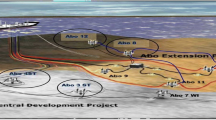Abstract
The International Convention for the Control and Management of Ships’ Ballast Water and Sediments (IMO 2018 Edition) was adopted in 2004 and entered into force on 8 September 2017, aiming to introduce global regulations to control the transfer of potentially invasive species Resolution (IMO MEPC.207(62) 2011). These efforts are translated into a wide range of solutions for retrofitting and new building services, which is evidenced through the substantial amount of data disclosed and analysed by different parties showing that optimization processes will have an important role for the existent management systems. Analysing a ballast water management installation project for oil tankers, categorizing the stakeholders involved and assessing properly the outcomes from an engineering perspective are important matters. The experience considered at the BWM Convention and its amendments set an important call to the industry in terms of milestones. Avoiding any delay in terms of operation is not the only answer to this call but also setting up an optimized and sustainable operation after the implementation process. The project management, on the subfield of stakeholders’ management (Bourne 2016), brings a myriad of individuals connected to ballast water management matters with different levels of knowledge, experience and commitment from an engineering perspective. This article aims to measure these factors and the stakeholders’ experience based on qualitative research into the ballast water management convention, with emphasis on the installation process on board. The data herewith analysed was obtained from a series of interviews conducted from January 2019 to August 2019.







Similar content being viewed by others
Data availability
The data set is part of an ongoing PhD Project and not currently available for the public.
Abbreviations
- BW:
-
Ballast Water
- BWM:
-
Ballast Water Management
- BWMS:
-
Ballast Water Management System
- IMO:
-
International Maritime Organization
- MEPC:
-
Marine Environment Protection Committee
- PMI:
-
Project Management Institute
- PMBoK:
-
Project Management Body of Knowledge
- ABS:
-
American Bureau of Shipping
- USCG:
-
United States Coast Guard
- DD:
-
Dry Docking
- NGO:
-
Non-Governmental Organization
References
ABS (2019) Best practices for operations of BWM systems report. American Bureau of Shipping, Houston
Bourne L (2016) Stakeholder relationship management - a maturity model for organisation implementation. Routledge, New York
Burkhard B, Maes J (2017) Mapping ecosystem services. Pensoft Publishers, Sofia
Castro MCT d et al (2018) Low salinity as a biosecurity tool for minimizing biofouling on ship sea chests. Ocean Sci:661–667
Cullen A, Mc Gee G, Gunton T, Day J (2010) Collaborative planning in complex stakeholder environments: an evaluation of a two tier collaborative planning model. Soc Nat Resour 23(4):332–350
Deglane KCB et al (2017) Stakeholders analysis in complex projects. Int J Humanit Soc Sci Invent 73–81
Det Norske Veritas (2018) Rules for Classification. Em: Pt.5 Ch.5 - Oil tankers. s.l.:DNV, p. 56
Eskerod P, Jepsen AL (2016) Project Stakeholder Management. Routledge - Taylor & Francis Group, New York
Gacther S, Arechar AA, Molleman L (2018) Conducting interactive experiments online. Exp Econ 21:99–131
Goerlandt F, Montewka J (2015) Maritime transportation risk analysis: review and analysis in light of some foundational issues. Reliab Eng Syst Saf 138:115–134
Gunton T, Rutherford M, Dickinson M (2010) Stakeholder analysis in marine planning. Environments 37:95–110
IMO (2018) 2018 edition. International Convention for the Control and Management of Ships’ Ballast Water and Sediments (BWM). IMO, London
IMO MEPC.207(62) (2011) Marine environment protection committee issued resolution. IMO, London
Jarvinen A (2013) Chapter 25 - consultative and learning approaches. In: Internatinoal Perspectives on Lifelong Learning. Routledge - Taylor and Francis group, London, pp 291–302
Jing L, Chen B, Zhang B, Peng H (2012) A review of ballast water management practices and challenges in harsh and arctic environments. NRC Research Press, pp 83–108
Joshi A, Kale S, Chandel S, Pal DK (2015) Likert scale: explored and explained. J Appl Sci Technol 7(4):396–403
Kelley K, Clark B, Brown V, Sitzia J (2003) Good practice in the conduct and reporting of survey research. Int J Qual Health Care 15(3):261–266
Kumar S, Hsiao JK (2007) Engineers learn “soft skills the hard way”: planting a seed of leadership in engineering classes. Leadersh Manag Eng 7(1):18–23
Littau P et al (2015) Managing Stakeholders in Megaprojects. University of Leeds, Leeds
Parviainen T, Lehikoinen A, Kuikka S, Haapasaari P (2017) How can stakeholders promote environmental and social responsibility in the shipping industry? WMU J Marit Aff 17:49–70
Project Management Institute (2017) A guide to the management body of knowledge - PMBoK guide, 6th edn. PMI - Project Management Institute, Newtown Square
Solesvik MZ, Westhead P (2010) Partner selection for strategic alliances: case study insights from the maritime industry. Indust Manag Data Syst 110(6):841–860
Wolejsza P, Thombre S, Guinness R (2015) Maritime safety – stakeholders in information exchange process. TransNav 9(1):143–148
Acknowledgements
The author would like to express their gratitude to Dr. Jorge Lopes for his valuable suggestions to this paper.
Author information
Authors and Affiliations
Corresponding author
Ethics declarations
Conflict of interest
The authors declare that they have no conflicts of interest.
ORCID (Sara Jorge): 0000–0002–4475-8978.
Additional information
Responsible Editor: Philippe Garrigues
Publisher’s note
Springer Nature remains neutral with regard to jurisdictional claims in published maps and institutional affiliations.
Rights and permissions
About this article
Cite this article
da Silva Jorge, S., Satir, T. A survey on the BWM Convention: analysing the stakeholders’ perceptions with emphasis on the acquisition process and operational expenditure. Environ Sci Pollut Res 27, 23529–23537 (2020). https://doi.org/10.1007/s11356-020-08722-3
Received:
Accepted:
Published:
Issue Date:
DOI: https://doi.org/10.1007/s11356-020-08722-3




